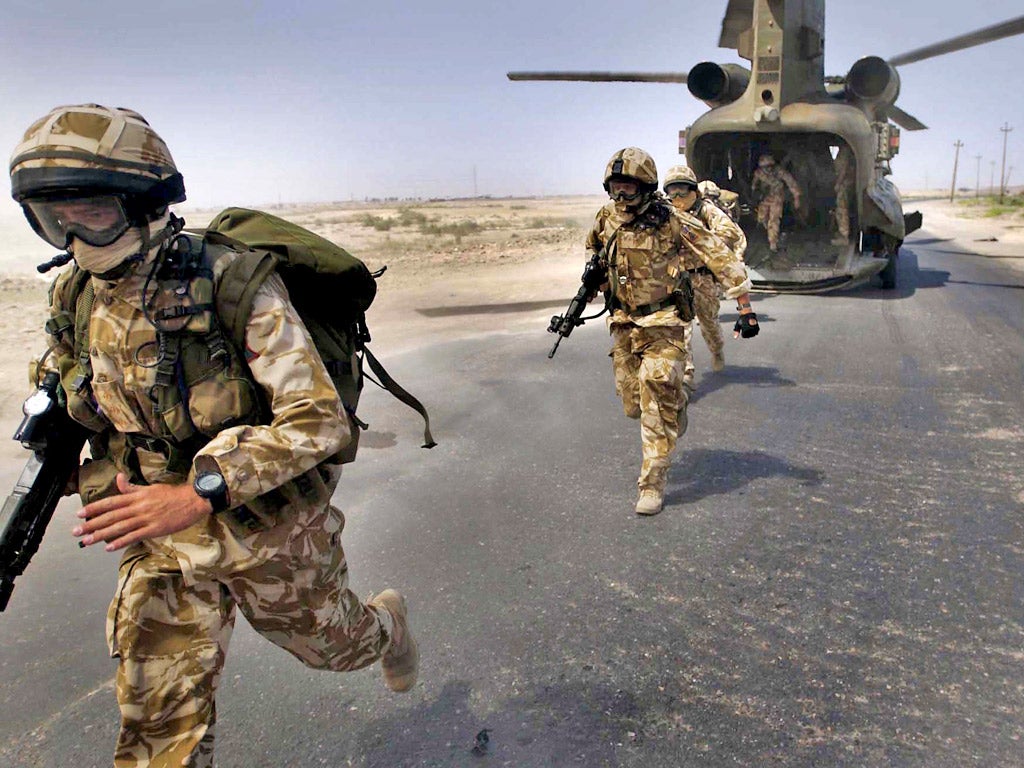Code of conduct could improve armed forces’ links with politicians after dysfunctional relationship resulted in Iraq War blunder
Systemic failure across government led to thousands of British soldiers being killed or wounded, says report

Your support helps us to tell the story
From reproductive rights to climate change to Big Tech, The Independent is on the ground when the story is developing. Whether it's investigating the financials of Elon Musk's pro-Trump PAC or producing our latest documentary, 'The A Word', which shines a light on the American women fighting for reproductive rights, we know how important it is to parse out the facts from the messaging.
At such a critical moment in US history, we need reporters on the ground. Your donation allows us to keep sending journalists to speak to both sides of the story.
The Independent is trusted by Americans across the entire political spectrum. And unlike many other quality news outlets, we choose not to lock Americans out of our reporting and analysis with paywalls. We believe quality journalism should be available to everyone, paid for by those who can afford it.
Your support makes all the difference.The dysfunctional relationship between politicians and generals which resulted in Britain’s disastrous blunders in Iraq and Afghanistan should be governed by a code of conduct backed by Parliament, to avoid future problems, according to a new report being released today.
For mistakes made by Tony Blair and Gordon Brown in wars which saw thousands of British soldiers killed or wounded, and cost billions, were part of a systemic failure across government for which others should share the blame, according to the report by James de Waal, visiting fellow at Chatham House think-tank.
“There is a widespread view that Britain’s politicians should bear the main blame for the country’s military difficulties in Iraq and Afghanistan. In particular, they are accused of failing to heed professional military advice and of launching over-ambitious missions with insufficient resources,” it says.
Instead, “Britain seems to have suffered a wider failure of the government system, with politicians, senior military officers and civil servants all playing their part,” according to the report, which covers the decade in which Britain joined US-led wars in Iraq and Afghanistan [2001-2010].
An informal approach of relying on good people who got along, instead “brought incoherence, inconsistency and opacity.” It “contributed to a continuing breakdown of trust between politicians and senior military officers, and disunity and division of purpose within the government.”
Fear of being accused of meddling in military affairs, and suffering unfavourable headlines, meant that politicians and civil servants “did little to ensure that military action supported political aims” and were “reluctant to challenge military opinion.”
As for senior officers, some “showed little appreciation of the political impact of military action,” while others sought to fight for the interests of their particular branch of the armed forces. The end result was “decisions on the use of military force not being taken solely on the basis of national interest, but because of politicians’ wish to maintain good relations with the armed forces.”
The report, by former diplomat and MoD official James de Waal, who contributed to the 2010 defence and security review, claims the scale of British involvement in Iraq was “primarily because politicians feared they would have problems with the British army if it was left out.” And as for Afghanistan, “In 2009, Downing Street was not convinced of the military need to send reinforcements to Afghanistan, but agreed to do so because it wanted to prevent hostile press briefings by the military.”
To guard against such issues arising in future conflicts, decisions over the use of force should be “subject to a formal code, approved by parliament. This code should define the process through which decisions are taken, and the roles and responsibilities of those involved.”
A more robust and transparent system is needed if the UK is to be able to ensure that its military and political leaders are united in the face of future conflicts, concludes the report.
Responding to the issues raised, Colonel Richard Kemp, former commander of British forces in Afghanistan, said: “It was clear from the outset of the wars in Afghanistan and Iraq that the Prime Minister should have established a war cabinet that should have had regular and frequent meetings to coordinate the actions of the whole government in support of the conflicts.” Failure to do so “led to disjointed military and political action.”
He added: “A war cabinet could also have energised the sluggish defence procurement system that throughout both conflicts for example saw vital military combat vehicles produced for war-time use but with peace-time production methods which led to protected vehicles that could have saved lives being manufactured with all the urgency of a family saloon.”
And Lieutenant General Sir Graeme Lamb, former director of British special forces, commented: “The military must have set out their responsibilities by Parliament and the People. They should then be equipped accordingly, trained continually and when asked provide answers to questions on their use and the likely consequences of their action. Those who then decide must heed their advice, but be equally prepared to understand the consequences of their decision.”
A Cabinet Office Spokesperson said: "We will look at the findings of the report with interest. The National Security Council was set up by this Government to strengthen decision-making procedures on national security issues. It demonstrates the high priority given to national security by the PM. The NSC brings together key Ministers, military and intelligence chiefs to consider a broad range of UK national security issues including foreign policy, defence, international relations, development, resilience, energy and resource security.”
Join our commenting forum
Join thought-provoking conversations, follow other Independent readers and see their replies
Comments